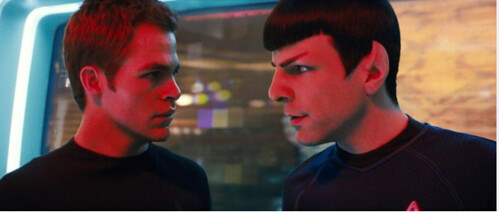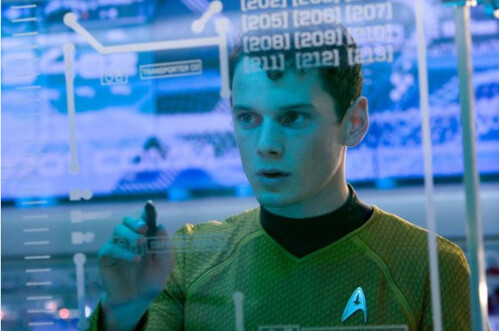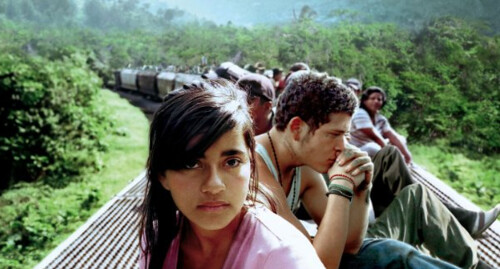
As I was watching this film, I found myself momentarily confused. I was unable to remember who the director was, what it was that had made me want to see this film so much, or if it was only the cast that drew me in. As tantalizing as Johnny Depp, Christian Bale and Marion Cotillard may be, I'd like to think that I am more sophisticated a moviegoer than that. (I admit that sometimes, a pretty face or acting chops are enough to get me into a seat, but none of these actors satisfy that yen for me.) Only when the credits started rolling and the giant "Michael Mann" splashed across the screen was I fully aware of the extent of my disappointment.
With a subject matter as rich, exciting, and myth-riddled as the lives of bank robbers during the Great Depression, let alone that of the most notorious of them all, John Dillinger himself, you would think that a film in the hands of as capable a director as Mann would be amazing. If not extraordinary, at least fascinating, thought-provoking, or even challenging. Public Enemies is, of course, none of these. It is merely a telling of what happened. These guys. Did stuff. And then they did other stuff and more people came along. This is how the film presents itself, a detail-less narrative of events and occurrences, peppered with machine gun fire, pretty faces, and arch smiles delivered from one polished face to another.
The opening scene appears to be Dillinger being admitted to a prison in the midwest somewhere, when all of a sudden you realize that it's an elaborate bust. Back in the days where security could not contain the likes of Dillinger and his gang, they just beat up a few cops and run away, leaning out of the windows and shooting guards with Tommy guns as they go. A close friend of Dillinger's goes down in the bust, and they periodically hearken to him, fondly, remembering his words on how to be most successful in their "business." After holing up for a little bit and then taking down a bank in Chicago, Dillinger sees Billie Frechette (Marion Cotillard) at a nightclub and determines that she is great and they are going to be together forever. She is part French and part Menominee Indian, and this allegedly lends her some appeal beyond her physical beauty, but we're just going to have to take their word on that one.
Meanwhile, Melvin Purvis (Christian Bale) is such a great FBI agent that he is promoted by J. Edgar Hoover (played by a fairly comical Billy Crudup) to helm the investigation to apprehend and kill Dillinger and any others in his gang. Purvis has a bunch of meatheads working for him, so he asks for a special task force to help out. So then a couple of grizzled old experts waltz in and suddenly know everything and how to really take 'em down. But John Dillinger is a tricky sumbitch, and he manages to flit around a little more before the final climactic showdown(s) where there are lots of special effects and bullets flying and we all grip our armrests in wide-eyed anticipation. Pardon the possible spoilers, but this is theoretically based on a true story so, I mean, obviously something happened.
Michael Mann has had a long-ish, illustrious-ish career of making films with short titles: The Insider, Collateral, Ali, Miami Vice. His films are usually powerful and intense, with some probing into the seamier side of human nature. However, his films are a bit like melba toast with cottage cheese and marmalade: good quality, full of things that are good for you, and wonderful if that's exactly what you're in the mood for. But they can also be dry, overwhelming, and unsatisfying if you really just want something sugary or to really fill you up. A film like Collateral was just right for what it needed to get across, which wasn't much, and The Insider did a really excellent job of laying out the facts as they were while Russell Crowe and Al Pacino took care of the rest. Those films were satisfying, filling. Public Enemies should have been a meal, not a snack.
It must take a unique personality to rob banks, kill police officers, escape prison, and keep a network of friends, associates and safehouses across the country. Someone like John Dillinger would have to be incredibly intelligent, ruthless and unbelievably charming. He would be in excellent physical shape and yet look unassuming enough to not draw excessive attention to himself. The Dillinger in Public Enemies only vaguely resembles the person he must have been. He doesn't appear to have much of a sense of humor or a particularly magnetic personality. His intelligence translates more as quickness and strategic skill, and his athleticism best used for hitting people really hard. Johnny Depp has taken on many roles where a strong personality shines through, so I know it is possible for him to execute such a task. The fault really must lie in the screenplay, and with three writers, it's a wonder that such a critical detail slipped them all.
I haven't read the book, and this movie didn't really instill in me any desire to do so. I never really found Dillinger that fascinating, but he probably could have been. He and all of his notorious brothers in arms: Baby Face Nelson, Pretty Boy Floyd, Pete Pierpont, etc. Only Nelson was played with any obvious idiosyncrasy, but he was probably the easiest to reduce to a caricature. It is so frustrating to think about how, how, GREAT this film could have been! I am not a screenwriter, so I don't really know what I would do to enhance the personalities, but I would start with some research.
These gangsters seem like they're just anybody. Any maybe that's the point, but what is really so irresistible in films about gangsters and criminals is to see just how off-kilter they are amid the regular human characteristics. Maybe these gangsters aren't sociopaths or psychotic, and maybe they are just opportunists who happen to be really good at something, but come on. This is a film. Give me something to watch.









